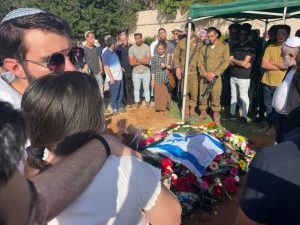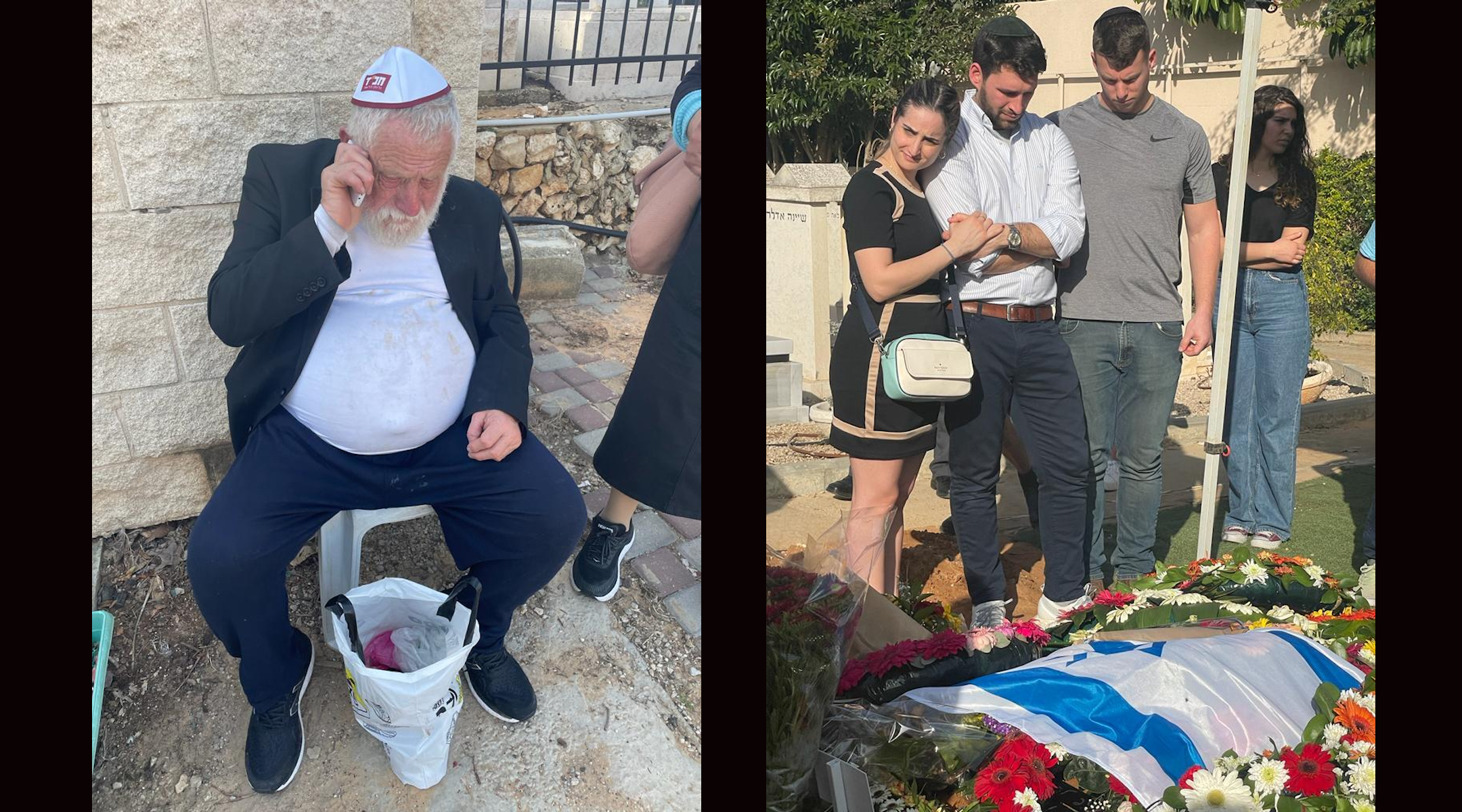
Orly Halpern
RA’ANANA, Israel — Recurring bouts of laughter were some of the most remarkable moments of the funeral of Elan Ganeles, the 27-year-old Jewish American from West Hartford, Connecticut, who was shot dead this week when driving through the West Bank.
Descriptions of an incredibly kind, open-minded, funny, brilliant and humble young man came in sharp contrast to calls by the official representative of the Israeli government at the funeral to avenge the death of those who harm Jews in the land of Israel.
“No one will raise a hand against a Jew in the Land of Israel,” said the representative, Rabbi Michael Eliyahu, who serves as Israel’s minister of heritage and is a member of the far-right Jewish Power party.
The contrast played out throughout the funeral, attended by nearly a thousand people in Ra’anana, a suburb of Tel Aviv.
Friends and family members remembered Elan as a caring and unique individual who brought joy to their lives, while those who did not know the recent Columbia University graduate, who was in Israel for a friend’s wedding, framed his heartbreaking story as the latest tragedy in Israel’s decades-old conflict with the Palestinians.
As Ganeles’ brothers and friends took turns, standing before his body wrapped in a shroud and laid out before them, they alternately choked up and laughed as they told stories about his love for learning and, for his friends, his disarming frankness and his “annoyingness.”
“Elan was intelligent, curious, goofy, idiosyncratic – and most famously lovably annoying,” said Akiva Raklin, a close friend of Elan, who knew him “since birth,” as people laughed aloud. “I know calling someone annoying at their funeral is a little less than traditional, but Elan was the only person on the face of the earth for whom this characteristic was absolutely positive in every way.”
Ganeles, recalled Raklin, would pose “intrusive questions” to his closest friends, making them “blush and cringe,” but they all saw his behavior for what it was: an expression of closeness and caring. “With every comment he made, no matter how irritating it was or how uncomfortable it would make someone, it would just make them closer to him,” he said, sparking chuckles and laughs from those who clearly knew him well.
Some of Ganeles’s friends came from abroad to attend the funeral, as did his family’s rabbi from Young Israel of West Hartford, who accompanied his physician parents on their trip to Israel.
“Elan was the ultimate friend,” said Ari Zaken, his roommate from New York, recounting a conversation they had in which Ganeles pulled out a list of over 100 close friends he made sure to keep in touch with.
Ganeles, an avid learner, traveler and birdwatcher, lived a life packed with knowledge and friends.
“He completed two majors in college, only one of which he planned to use, just because he loved to learn,” said his younger brother, Gabe. “He worked two jobs simply because he had so much interest in what he could learn from both. He was our resident expert in geography, history, travel, birds. He loved trivia and made trivia games for family and friends and he was able to finish the hardest crosswords in record time.”
Gabe ended his eulogy, breaking down in sobs: “Elan was my brother, my best friend and a huge inspiration to me. And I will miss him,”
On Monday, Elan dropped Gabe off at a train station in the north and then made his way south on Route 90, which passes through the length of the West Bank, alongside the border with Jordan, on his way to attend a friend’s wedding in Jerusalem that night. On the road that goes around the city of Jericho, he was shot by a Palestinian gunman.
“I was so lucky that I got to spend the last week of his life with him,” said Gabe, recalling their trips through historical sites in Israel in the past week. ”He used his unique skill of complete unabashedness to bring people together at every chance he got,” said Gabe. “Despite his brashness, Elan was the most thoughtful person I know.”
The Ganeles family tried to avoid turning his funeral into a political event and reportedly requested TV networks not to attend the ceremony. “He’s a friend of ours, not just another victim,” said Jamie Landau, 27, who went to a five-month ulpan in August 2015 with Elan Ganeles on kibbutz Sde Eliyahu. Afterward, both joined the Israeli army. Elan served in the Mofet Unit as a computer programmer, working on soldiers’ salaries.
Nevertheless, Heritage Minister Michael Eliyahu had a clear message: “I tell you as a minister in the state of Israel … I say, ‘we failed’ and we need to do everything so that won’t happen.” The newly appointed cabinet minister went on to call for revenge following Elan’s murder. “It’s not acceptable that a Jew who comes to this country will be scared to be here,” Eliyahu said. “And if we do have haters, may God avenge their blood and we will avenge their blood.”
As the funeral was being held, Israeli forces raided a Palestinian refugee camp adjacent to the city of Jericho, not far from where Ganeles was killed, and apprehended four Palestinians, one of them suspected of carrying out the shooting attack that killed Ganeles and the other of assisting him. Another Palestinian was killed during the raid.
Hundreds of people attended the funeral, filling Ra’anana’s old cemetery to the brim. More watched from outside the cemetery walls, listening to a live feed of the eulogies on each others’ cell phones. The majority were religious and did not know Ganeles, showing up out of a sense of duty and a wish to pay respect to the slain Jewish American visiting Israel. Some marched in with large Israeli flags, giving the private funeral ceremony an air of a national event.
Elan Ganeles was raised in a Modern Orthodox family in Connecticut and attended yeshiva in Israel after graduating from high school. He then decided to stay in Israel and served for two years in the IDF before returning to the United States to attend college.
Liora Lutrin, a 15-year-old student from Amit Rananim religious girls’ high school, who made aliyah a year and a half ago, stood with her classmates singing “Our brothers of all of the House of Israel.”
“We came with our school to show respect,” said Lutrin, who had five earrings in her right ear and wore a gray T-shirt and an above-the-knee black skirt. “He sacrificed his life to come here and be a soldier in Israel and even though he didn’t die as a soldier, he supported our country and now it’s our turn to support him.”
Or Cohen, a 25-year-old student wearing sandals, who came during a lunch break from his yeshiva in Ramat Gan, said it “was the least I could do.” Cohen, originally from Otniel settlement, said, “I heard he’s a new immigrant, someone whose parents don’t live here. I came in identification with the pain of the people, to show respect for my brother, who was murdered. This is bigger than us.”
After the funeral ended, dozens of people lingered near the grave.

After the funeral of Elan Ganeles in Ra’anana, Israel, friends loitered by the grave while a beggar, a common presence at Israeli funerals, sat nearby. (Orly Halpern via JTA.org)
Joining them was Mordechai Goldberg, a 70-year-old religious beggar with a stained white shirt and a cheap black suit jacket, who arrived from Jerusalem to attend and to panhandle at the cemetery, a common sight in Israeli cemeteries. Goldberg entered the circle of people around his grave and began saying the Kaddish prayer. The crowd automatically answered with ‘Amen.’ When the prayer ended, he began calling for the death of Arabs. “We will all pray to God that all of the Arabs die under our feet, now,” said Goldberg as some of the people responded with ‘Amen,’ while others remained baffled by the call.
“I don’t think that would represent Elan’s opinions,” said a young religious woman with an American accent, whose eyes were red from crying, and whose brother was another of Elan’s ‘best friends.’ “He wasn’t like that,” she said.
Indeed, Elan’s uncle, Dov Ganeles told the Jewish Telegraphic Agency that Elan marveled over his uncle’s friendship with an Arab colleague.
“He thought it was lovely that such a relationship could exist and be normal,” said Dov Ganeles. “He was proud of that, that that relationship could exist. It was something to cherish.”



